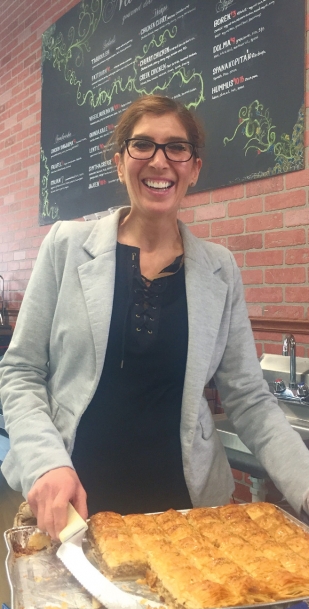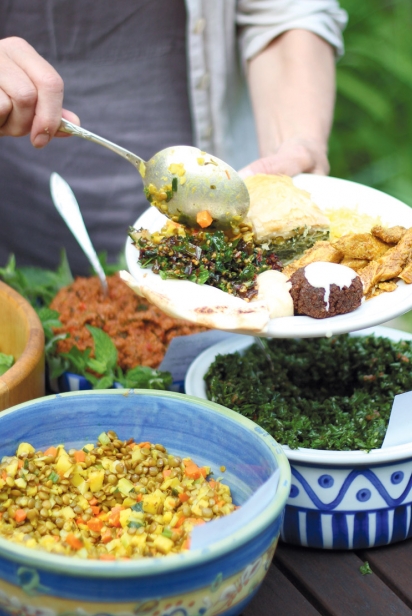Nada’s Oasis and Culmination of a Journey
On the first day, she made hummus. When Nada Saco opened her deli in April 2015 in Traverse City, she wanted to gradually introduce her customers to Middle Eastern food that she knew would prove foreign to some. Her husband, Mark, had just purchased the liquor store on West Front Street and she didn’t want to upset the apple cart. Nada continued to serve the sandwiches and soups for which the locale, previously called Mahoney’s Spirits & Edibles, had been known.
“I served wraps out of a cooler and their kind of soup,” said Saco, an Iraqi Chaldean Catholic who immigrated to Detroit as a teenager. “But I realized ‘This is not me. This is not my food.’ I didn’t want to scare anyone, so I started with eight-ounce containers of homemade hummus.” She followed that relatively familiar Middle Eastern dish with her colorful, delicious and healthy salads: quinoa kale, bulgur, then tabbouleh.
During her first months in business, Saco wouldn’t let anyone out the door without a taste of her homeland. “Every time someone walked in, I would open the cooler and say ‘Can you sample this? Can you sample this?’”
Nada quickly convinced Mark that food out of a cooler wasn’t enough. So they added a glass deli case, which she stocked with Mediterranean and Middle Eastern culinary delights, both familiar and foreign: falafel and chicken shawarma; dolmas, borek and spanakopita; tabbouleh, fattoush, kibenaya, simthagrease and jajeek salads. To be followed by honey-dripped baklava and dense, nutty halva.
I stumbled upon Nada’s Gourmet Deli one misty autumn day at the exact moment my stomach was rumbling for Middle Eastern fare. A miracle of place and time, I thought. Nada handed me a sample of tabbouleh, and I ordered a chicken shawarma with a couple of dolmas and a triangle of baklava. Her warm hospitality and my joyous taste buds immediately transported me to past culinary journeys through the Middle East: a shawarma stand near the Old City of Damascus, where the cook carved thin shavings of lamb off the rotating spit and nestled them in a warm pita; a village on the Syrian-Lebanese border lined with open-air sweets shops where Arabic boys hand delivered stacks of halva and packs of cigarettes to a parade of cars waiting for customs officials; grape leaves, salads, mint-braised meats and labneh cheese offered at a village celebration in Jenin in the West Bank.
There in the cradle of civilization, and here at Nada’s, hospitality rules the day. I recalled an expression a Palestinian farmer once told me: “When you visit my home, you sleep in my bed, and I’ll take the front porch.”
Nada had created a lunchtime oasis here in Traverse City.
My family quickly fell for her delicacies as well. When my mother opted for a July garden party with catered food to celebrate her 65th birthday, we looked to Nada’s Deli, which now caters private events when Nada has enough staff on hand. My mom was drawn to Nada’s salads, in particular, because they are fresh, nutritious and made with love. They are also free of gluten and dairy, which was imperative for some of her birthday guests.
JOURNEY THROUGH THE MEDITERRANEAN TO MICHIGAN
The contemporary Iraqi story is too often marred by tragedy, conflict and exodus. Worried that Nada’s military-age brother would be forcibly conscripted into Saddam Hussein’s Baath party, the Saco family left Baghdad in 1980, just as the first shots were fired in the devastating war between Iraq and Iran.
They traveled through Turkey, Yugoslavia and Greece, the same route taken by the current wave of refugees. Two years later they arrived in Detroit, which was home to the largest Chaldean Catholic community in the United States. Nada was 13, and spoke little English. Her integration into American society did not come easily: She faced health issues and was bullied at school. But her family became leaders of the community. Her father became a de facto ambassador and welcomed subsequent Chaldean refugees to Detroit; he also opened a convenience store in Mexicantown, where Nada worked and picked up much of her colloquial English.
“I also watched a lot of cartoons and scary movies,” she laughed.
At 23, she married Maher (who later Anglicized his name to Mark), also from the tight-knit Iraqi Chaldean community, and moved with him north to Kalkaska where Mark would run his father’s gas station. Wary of being in a rural community so far from her family, Nada told herself ‘I’m moving back [to Detroit] in a few years.’
“With my husband working all the time, I was just sitting home in Kalkaska,” she lamented. “We had come to such a small town, where I didn’t know anyone and couldn’t do anything.”
Nada became pregnant with their first child, then their second. She stayed home to raise them, and that’s when her love for cooking began.
“I always loved food, in the way my mom used to cook. But she was back in Birmingham [a suburb of Detroit] so I called and asked her how to make this or that. But she had no such thing as a recipe. She’d say things like, ‘Put the rice in water, stand a spoon in it and cook it. If the spoon falls over, it’s not done yet or you added too much water’.”
Nada considers herself a self-taught cook. “I’d make things and they’d come out perfect the first time, so I’d challenge myself and experiment.” She approached Maher and said she wanted to open a Middle Eastern eatery. But he responded, “Who would come and eat that?” In Kalkaska, he feared, no one knew about that kind of food.
Her dream of opening a place to serve her native food grew and grew, but along came a third child, then a fourth. Instead, Nada’s homemade dolmas and baklava became a fixture for her son Nico’s traveling hockey team. His friends loved coming to the Saco household for dinner.
“I cooked for the traveling teams and served my food to all the other hockey parents,” said Nada, whose family moved in 1998 to Acme. “We were doing so many events, and I always had a dish to pass. I noticed that people were loving the food I was making.”
Twenty-three years after their transition to Northern Michigan, Nada and Maher Saco, who now owned a pizzeria and carwash in addition to the original gas station, purchased the liquor store in Traverse City, and Nada opened her Middle Eastern deli. Though months of hard work would follow, her dream had come true.
And what does Nada’s mother Samria—now 79 and still cooking Sunday meals for the family—think about her daughter’s food?
“She is a good cook and she thinks nobody can do it better than her,” laughs Nada. “To this day she’ll tell me ‘No, no, you gotta do it this way.’ She doesn’t give compliments or tell me ‘This is amazing.’ Instead she’ll come to my house and say, ‘I’m so hungry.’ Behind my back I’ll hear her complimenting my food to someone else. That feels great.”
IF YOU GO:
Nada’s Gourmet Deli
542 W. Front St., Traverse City • 231-947-6779
Open Monday–Saturday 10 AM–7 PM • Sunday NOON–6 PM






